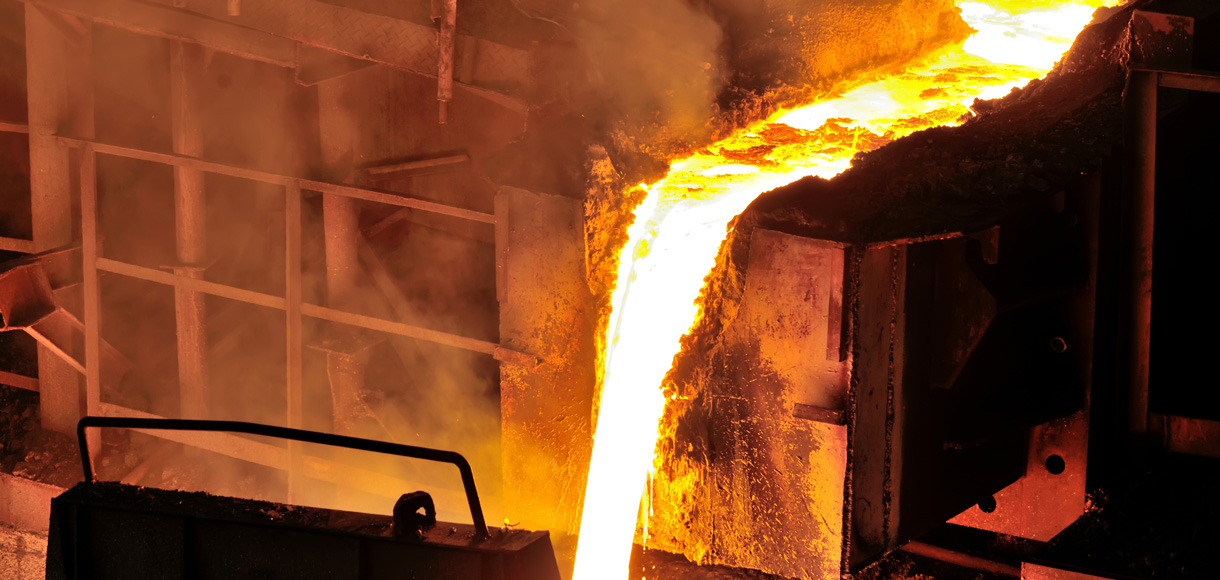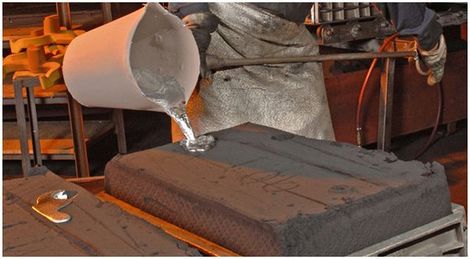Just How a Metal Foundry Adds to Sustainable Metal Manufacturing Practices
Metal foundries play an important role in advertising sustainability within the metal manufacturing industry. By integrating recycled materials, they reduce dependence on virgin resources and lessen environmental effects. Energy-efficient melting procedures additionally decrease energy usage and discharges. Nevertheless, the trip toward lasting practices entails greater than simply reusing and power administration. It incorporates a wider dedication to ethical sourcing and ingenious innovations. The effects of these practices are considerable and warrant more detailed examination.
The Function of Recycling in Metal Foundries
While metal manufacturing has actually commonly counted on virgin products, the raising focus on sustainability has resulted in a substantial shift in practices, particularly in metal foundries. Recycling has become an important element of this change, permitting foundries to repurpose scrap metal and lower reliance on extracted resources. By incorporating recycled materials into their processes, foundries not just lower environmental effect but likewise reduced production prices.
Using recycled metals, such as copper, light weight aluminum, and steel, decreases energy usage and minimizes greenhouse gas discharges related to standard mining and refining techniques. Foundries can accomplish top quality outputs by using sophisticated sorting and processing technologies to assure the purity of recycled products. This focus on reusing fosters a circular economic climate, where waste is minimized, and resources are used effectively. Metal foundries play an essential function in advertising sustainable practices within the metal production market.
Energy-Efficient Melting Strategies
Energy-efficient melting strategies are important for enhancing sustainability in metal manufacturing. These strategies significantly lower energy usage during the melting procedure, which is one of the most energy-intensive stages in metal production. Technologies such as induction melting, resistance home heating, and microwave melting deal boosted effectiveness compared to typical methods. Induction melting, as an example, uses electromagnetic fields to create warm straight within the metal, reducing energy loss and supplying specific temperature control.
In addition, executing warm recuperation systems can further improve effectiveness by capturing and reusing waste warmth created throughout melting. Using innovative insulation products and enhancing heating system styles also add to energy financial savings. By adopting these ingenious melting strategies, metal foundries can decrease their carbon impact, reduce functional costs, and add to a more lasting production landscape. The combination of energy-efficient practices not just lines up with environmental objectives however additionally satisfies the growing demand for responsible production techniques in the metal market.
Lasting Sourcing of Raw Materials
Sustainable sourcing of resources is crucial for minimizing the environmental influence of metal production. This entails the enhanced usage of recycled metals, the fostering of moral mining methods, and initiatives targeted at neighborhood sourcing. By focusing on these methods, the industry can advertise liable source monitoring and support neighborhood economic climates.

Recycled Metal Usage
Just how can markets properly minimize their ecological impact while meeting the expanding demand for metal? One significant approach is the utilization of recycled metal. By incorporating scrap metal into their manufacturing processes, foundries can reduce the removal of virgin materials, consequently decreasing and saving natural sources energy consumption. Recycled metals call for much less power to process contrasted to their raw counterparts, leading to lower greenhouse gas discharges. Additionally, using recycled metal aids divert waste from garbage dumps, advertising a circular economic situation. Industries that prioritize recycled metal not just add to sustainability but likewise advantage from price financial savings related to reduced product procurement. Subsequently, recycled metal application stands as an important method for environmentally accountable metal production.
Moral Mining Practices
While the need for steels proceeds to rise, industries are increasingly recognizing the relevance of honest mining practices in making certain accountable sourcing of basic materials. Honest mining includes a dedication to ecological stewardship, social duty, and adherence to fair labor practices. Companies are now prioritizing collaborations with mines that show openness in their operations, reducing eco-friendly influence and appreciating local communities. This method not only cultivates a sustainable supply chain yet also improves the online reputation of companies involved. By applying extensive requirements and accreditations, industries can battle illegal mining activities and advertise the welfare of employees. Ultimately, honest mining methods add noticeably to a much more sustainable metal manufacturing environment, aligning financial growth with ecological and social stability.
Local Sourcing Efforts

Advancements in Metal Casting Processes
Advancements in metal casting procedures are transforming the sector by integrating sophisticated recycling methods that lessen waste. Energy-efficient melting methods are likewise being developed to decrease energy consumption during production. Additionally, making use of cutting-edge mold products contributes to boosted performance and sustainability in casting procedures.
Advanced Recycling Techniques
Advanced recycling techniques are transforming metal casting procedures, significantly enhancing sustainability in the industry. These technologies concentrate on reclaiming and reprocessing scrap metal, significantly lowering waste and the requirement for virgin products. Methods such as hydrometallurgy and pyrometallurgy make it possible for foundries to remove useful metals from made use of elements, making sure efficient source usage. Furthermore, advanced sorting and filtration innovations boost the quality of recycled steels, making them suitable for high-performance applications. This not just reduces the ecological footprint of metal manufacturing yet also fosters a circular economy by promoting the reuse of products. As these recycling approaches remain to develop, they promise to find more info additionally simplify procedures within foundries and contribute to an extra sustainable metal manufacturing landscape.
Energy-Efficient Melting Methods
While traditional melting approaches have actually long been the foundation of metal casting, current improvements have introduced energy-efficient methods that markedly minimize power intake and discharges. Technologies such as induction melting and electric arc heating systems have actually gotten prominence, allowing for exact control over temperature and reducing the need for nonrenewable fuel sources. These techniques not just enhance energy efficiency yet additionally advertise much faster melting times, which translates to reduce operational prices. Furthermore, developments in warmth recuperation systems allow foundries to catch and recycle excess warm generated throughout the melting process. This all natural strategy to power monitoring not just sustains lasting methods however also placements moved here metal foundries as leaders in the change in the direction of greener production processes, better straightening with international sustainability objectives.
Ingenious Mold Materials
As the demand for more efficient and lasting metal casting procedures expands, the exploration of cutting-edge mold and mildew materials has come to be a focal factor in the market. Typical mold products frequently contribute to ecological difficulties, motivating the look for choices that decrease waste and power usage. Recent developments include the development of naturally degradable binders and recyclable compounds, which not only improve mold and mildew performance however also reduce eco-friendly effect. Additionally, using 3D printing technology in mold and mildew production enables complex styles that reduce product usage and enable fast prototyping. These cutting-edge materials not only boost casting precision yet additionally straighten with sustainability objectives, showcasing the industry's commitment to lowering its carbon footprint while maintaining high-quality production criteria.
Decreasing Waste Via Advanced Innovation
Ingenious modern technologies are changing the metal production market by greatly lowering waste and enhancing effectiveness. Advanced data analytics and equipment knowing formulas allow foundries to optimize production procedures, reducing and recognizing inefficiencies scrap material. Smart sensors check devices performance in real-time, permitting predictive upkeep that minimizes downtime and waste generation. Additionally, additive manufacturing methods, such as 3D printing, permit the creation of complicated elements with minimal material usage, considerably decreasing waste contrasted to traditional techniques.
Additionally, closed-loop systems are ending up being a lot more common, wherein scrap her explanation metal and byproducts are recycled back right into the manufacturing cycle, guaranteeing that materials are made use of to their greatest potential - Aluminum Foundry. This integration of innovation not only promotes resource preservation yet likewise improves the total sustainability of metal manufacturing methods. By welcoming these innovations, foundries can add to a much more lasting future while keeping competitiveness in the marketplace
The Effect of Foundries on Carbon Footprint Reduction
Foundries play a crucial role in minimizing the carbon impact of the metal production industry by applying numerous sustainable techniques. By using energy-efficient modern technologies, such as electrical arc heaters, these centers significantly reduced greenhouse gas exhausts contrasted to conventional techniques. Furthermore, foundries increasingly adopt renewable energy sources, which likewise reduces their dependence on fossil gas.
Reusing scrap metal is an additional vital method that foundries utilize, conserving resources and reducing the need for virgin materials. This not only reduces waste yet also reduces the energy-intensive removal processes connected with mining. The adoption of closed-loop water systems assists to decrease water use and minimize wastewater discharge, contributing to an extra lasting operation.
Via these efforts, foundries demonstrate their commitment to environmental stewardship, leading to a significant decrease in the overall carbon impact of the metal manufacturing field. Their ongoing efforts are crucial in the change towards a more lasting industrial landscape.
Often Asked Concerns
What Sorts of Metals Are Many Frequently Recycled in Foundries?
Light weight aluminum, brass, steel, and copper are among one of the most typically recycled steels in foundries. These steels are preferred due to their high recycling prices, economic value, and widespread schedule, contributing substantially to industrial sustainability initiatives.
Just How Do Foundries Make Sure the Top Quality of Recycled Materials?
Foundries determine the quality of recycled products via strenuous testing, sorting, and filtration procedures. They execute innovative modern technologies to evaluate composition and eliminate contaminations, guaranteeing that the recycled metals fulfill market criteria for efficiency and security.
What Certifications Exist for Sustainable Foundry Practices?
Different accreditations exist for sustainable foundry practices, consisting of ISO 14001 for environmental monitoring, ISO 50001 for energy management, and LEED qualification for sustainable building practices (Aluminum Casting). These qualifications aid guarantee adherence to environmental and sustainability requirements in operations
Just How Do Foundries Gauge Their Carbon Footprint Reduction?
Foundries measure carbon impact reduction with devices like lifecycle evaluations, power audits, and discharges tracking systems. They compare standard emissions to present results, assessing renovations in power efficiency, product usage, and renewable energy adoption gradually.
What Are the Financial Benefits of Sustainable Metal Manufacturing?
Sustainable metal manufacturing provides economic advantages such as decreased functional expenses, boosted efficiency, improved market competition, and prospective federal government incentives. Additionally, it promotes development and brings in eco aware consumers, ultimately driving long-term profitability for businesses.
Metal foundries play a necessary role in advertising sustainability within the metal manufacturing market. While metal manufacturing has commonly relied on virgin materials, the raising focus on sustainability has led to a substantial shift in methods, especially in metal foundries. By including scrap metal into their manufacturing procedures, foundries can reduce the extraction of virgin materials, thus reducing and saving all-natural resources energy usage. Foundries play an important function in minimizing the carbon impact of the metal manufacturing industry by carrying out numerous sustainable practices. Reusing scrap metal is another critical practice that foundries utilize, conserving resources and minimizing the demand for virgin materials.